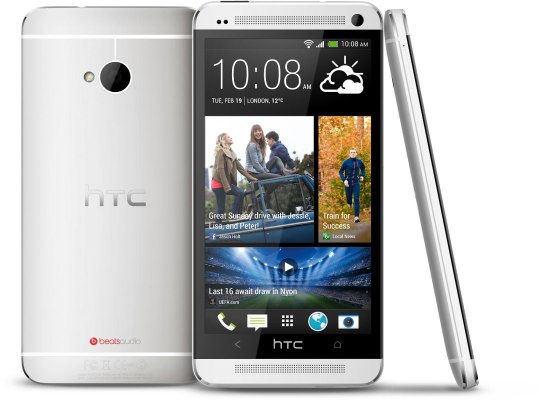The new HTC One unveiled last month is increasingly feeling like last-chance saloon for the troubled Taiwan handset maker. Today HTC noted that its sales for the month of February fell by nearly 44% to 11.37 billion Taiwan dollars ($384 million), from NT$20.3 billion for the same month one year ago. Looking at the bigger picture, that NT$11.37 billion is barely higher than what HTC made in January 2010, when it reported NT$11.12 billion in sales.
Compared to January 2013’s revenues of $15.54 billion, sales in February 2013 were down by nearly 27%. HTC does not report unit sales or net income in its monthly market updates but its last quarterly report released in January, for Q1, saw a 91% drop in profit to $34 million, its lowest since 2004.
The Android-based HTC One, launched in February, has met with some favorable reviews for the most part — including winning the best-device award at last week’s Mobile World Congress. But the big question is whether that will be enough to help the company claw back some of the market share that it has lost to companies like Samsung and Huawei on the Android front, as well as Apple in the larger picture for smartphones.
According to Gartner’s figures, in Q4, HTC barely kept its place in the top-ten rankings for mobile handset makers, with a global share of 1.8% of all sales with just over 32 million units, to come in at number 10. That was down from 2.4% a year ago. To put that into perspective, Samsung sold more than 10 times as many handsets, and Nokia 10 times as many, and smartphone-only Apple four times as many.
HTC has taken a very different approach to the likes of Samsung in tackling the smartphone market. Samsung has followed the route trailblazed by Nokia of creating a huge catalogue of devices ranging from low-end feature phones up to top-of-the-line flaghship smartphones with all the latest bells and whistles. HTC, on the other hand, has elected to focus only on smartphones. That gives it less of a chance to on-ramp lower-end users to its brand. And when it comes to targeting consumers with a high-end, smartphone-first strategy, Apple has dominated that market for some time.
Meanwhile, HTC’s strategies for trying to spin more content attractions around the device have had very mixed success. During the company’s launch event for the new HTC One — the first under a new CMO Benjamin Ho — the company unveiled a new content streaming effort called Blink Feed, partnering with companies like AOL to provide information directly on the home screen of its devices. Partnerships appear to be the way ahead for HTC rather than trying to create or invest in services itself — the company last year cashed out part of its stake in Beats Electronics, becoming only a minority shareholder.
Although the audio technology company continues to provide technology for HTC devices, it is also doubling down on its own standalone efforts, including the news today that it will be spinning out its “Daisy” music streaming service after getting a new $60 million injection from investors including Leonid Blavatnik’s Access Industries.
